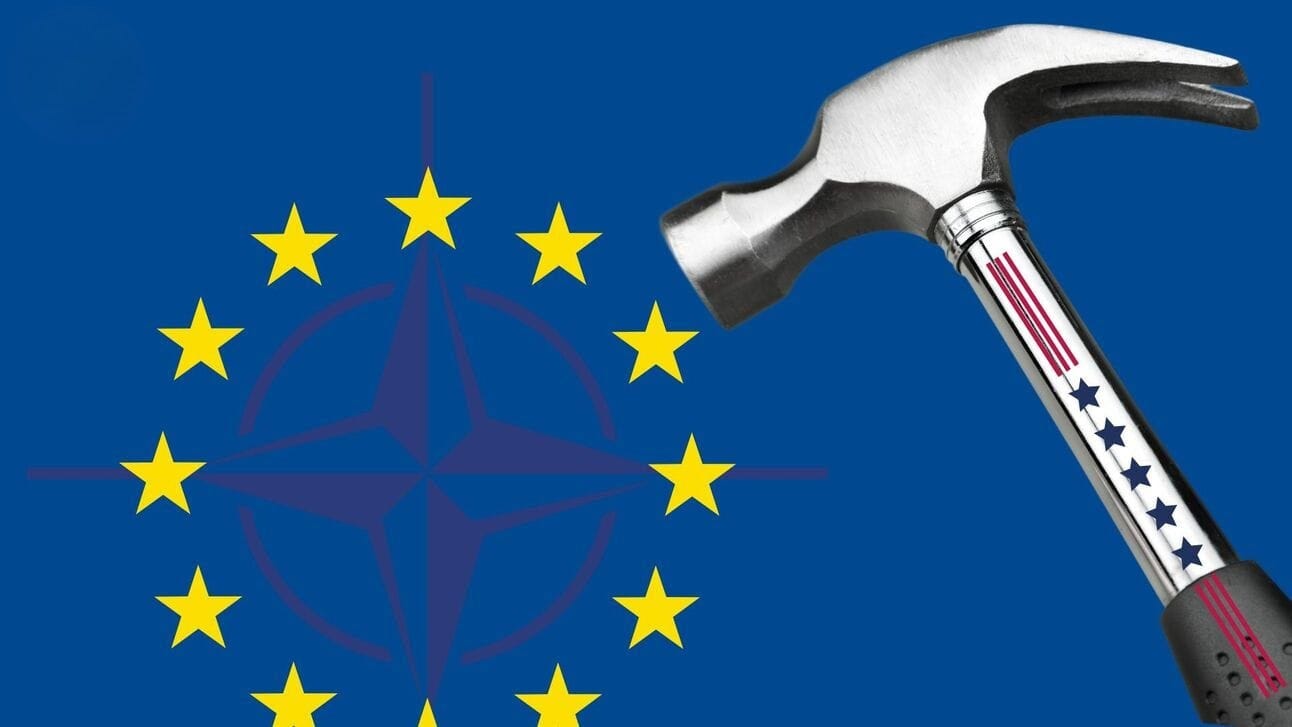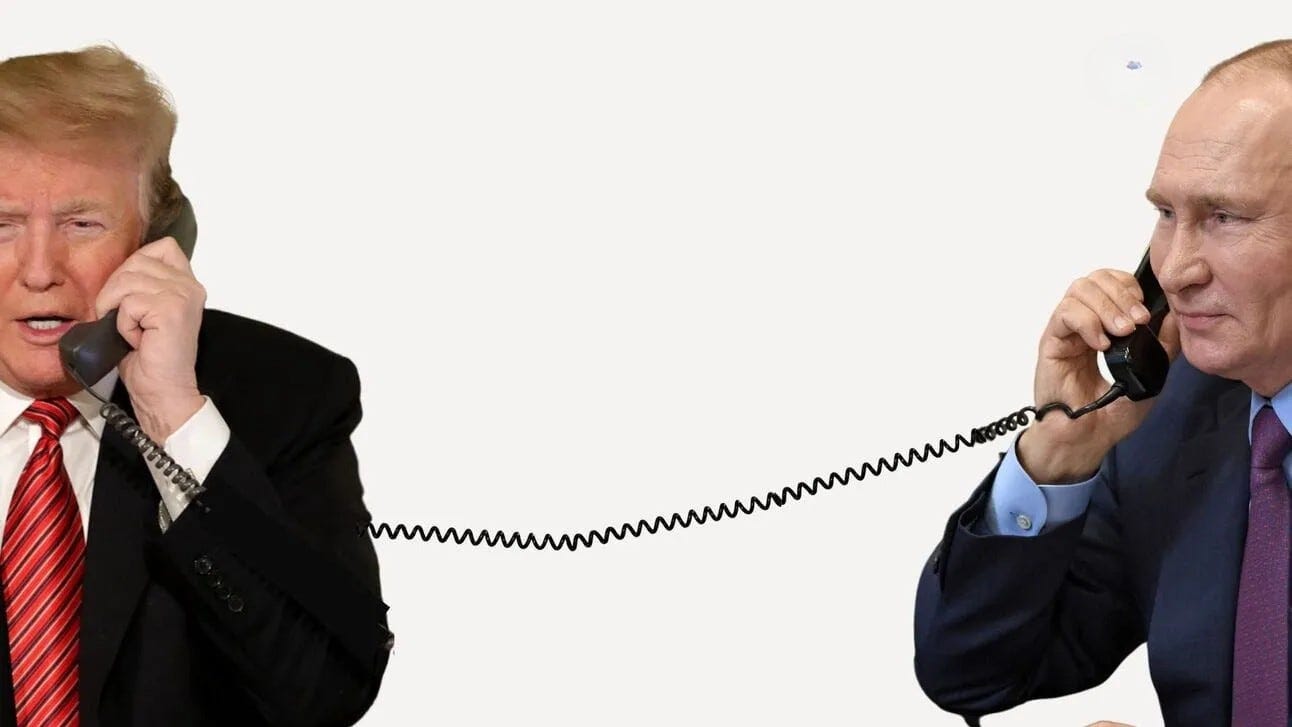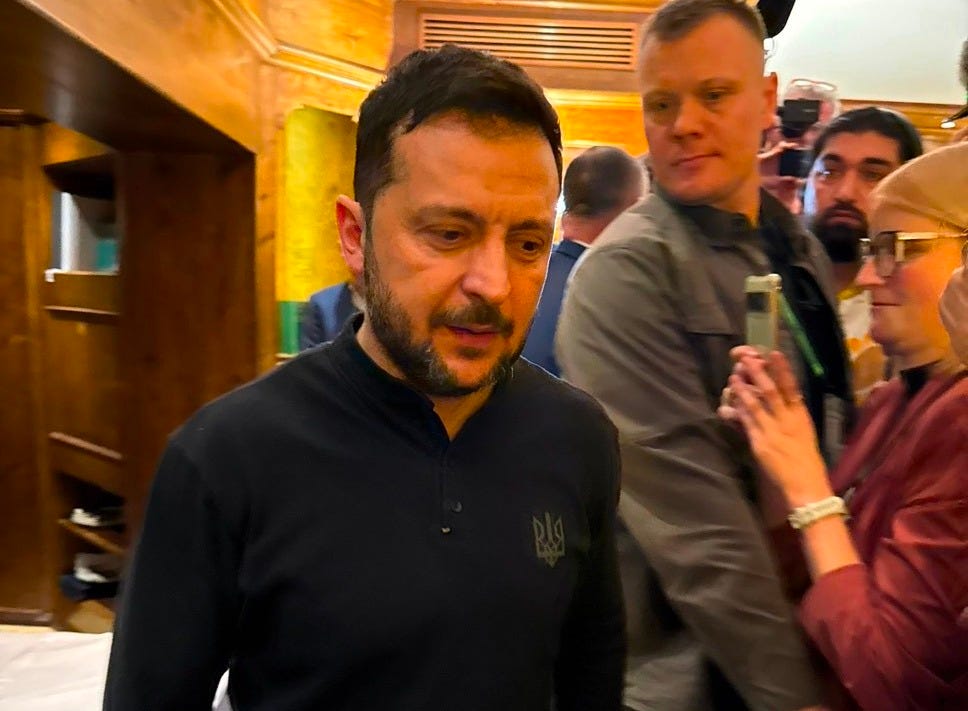The Sound of Munich: The Predictable Collapse of Transatlantic Unity
"Nations have no permanent friends, only permanent interests." Charles de Gaulle’s words have never felt more relevant today. For the past three weeks, Trump has been making it clear that alliances—even long-standing ones—are now only transactional. Nowhere is this shift more evident than in Ukraine, where Washington’s latest moves suggest that Europe must now fend for itself.
Back in January, Zelensky asked the Davos crowd, “Right now all eyes are on Washington, but who is actually watching Europe?”
By now, all attention has turned to Munich, where world leaders, top diplomats, and defense officials convened for the annual Security Conference—only to have their agendas thrown into disarray by Washington’s abrupt and seismic shift on Ukraine.
Quick Background: The Munich Security Conference (MSC) is one of the world's leading forums on international security policy, held annually in Munich, Germany. and first established in 1963 during the Cold War. it’s sometimes called the “Davos of Defense”
What Happened Before Munich
🔎 Just before leaders jetted off to Bavaria for the Munich Security Conference, newly appointed U.S. Defense Secretary Pete Hegseth made waves in Brussels with a message that signaled a fundamental shift in U.S. strategy. His remarks, blunt and consequential, reshaped expectations for Ukraine’s future:
The prospect of Ukraine reclaiming its occupied territories? Unrealistic.
NATO membership for Ukraine as part of a peace deal? Off the table.
Security guarantees? They must now be led by European forces, with limited contributions from other allies.
Any such deployment would operate outside of NATO—meaning no automatic U.S. military protection.
No U.S. boots will be on the ground in Ukraine.
Going forward, Europe must bear the vast majority of responsibility for supporting Ukraine.
Meanwhile, Washington will focus on tightening sanctions enforcement and expanding its oil and gas production to curb Russia’s financial resources.
Hegseth justified the move as a matter of global priorities, explaining that the U.S. must “ensure deterrence in the Pacific, acknowledge resource constraints, and make the necessary tradeoffs to prevent strategic failure.”
The underlying message? Europe: you take the lead.
It’s worth noting that the US wanting to shift its policy from Russia & the Middle East to China, has been the cornerstone of Obama’s Foreign Policy. Whatever one might say about Democrats and Republicans, they do still follow somewhat the same policy, regardless about what is being said in public.
Just as the world was still digesting the seismic shift in U.S. policy, President Trump dropped another bombshell—revealing that he had just wrapped up a 90-minute phone call with Vladimir Putin.
The agenda? Practically everything: Ukraine, the Middle East, energy, AI, the strength of the dollar, and “various other subjects.” But the most significant takeaway was Trump’s announcement that he and Putin had agreed to begin direct negotiations to end the Russo-Ukrainian war “immediately.” He even pledged reciprocal visits with the Russian leader—making it clear that the ICC arrest warrant for Putin was, at least in Trump’s view, no longer a concern.
When pressed on whether his Secretary of State had just undercut Ukraine, Trump pushed back: “I’m backing Ukraine,” he insisted, adding, “frankly, we’ll go as long as we have to go”—because, in his words, letting Putin win outright wasn’t an option.
Meanwhile, in an unexpected move, newly appointed Treasury Secretary Scott Bessent made a surprise visit to Kyiv, where he pitched President Zelensky on a fresh U.S.-Ukraine economic partnership. Bessent framed the visit as “an important signal to the world, to Russian leadership, that we stand together.”
How the ‘World’ Reacted
With the Munich Security Conference kicking off the next day, leaders scrambled to digest this strategic shift. Here’s how it landed across the globe:
🇺🇦 Ukraine:
Overnight, Ukraine’s NATO path went from “irreversible” to “unrealistic”; reclaiming annexed territory went from “never, never, never” to “illusionary”. Some solace came from:
Hegseth not explicitly ending US assistance
Trump pushing back on claims he’s abandoning Ukraine
Bessent personally delivering a new economic partnership proposal
🇪🇺 Europe:
The US’s 75-year-old NATO security guarantee went from “sacred commitment” to “Europe must lead in Europe”. Notably, Hegseth even toned down his prepared remarks—his original draft stated outright that the US is no longer Europe’s primary security guarantor.
And maybe this is what Europe needs, where only two countries (the UK and France) have capable armies. For a continent that aims to become one of the three poles of power in the next decades, being able to project power seems like a pre-requesite.
🇷🇺 Russia:
Where Putin has been failing militarily for the past three years, this week he managed to score a few victories.
No NATO membership for Ukraine
De facto US acceptance of Russian territorial gains
The legitimacy of a direct call (and possible in-person visit) with the US president
A direct US-Russia negotiation channel over Ukraine—potentially sidelining both Ukraine and Europe
The Mood at Munich
🇺🇸 And so, the Munich Security Conference opened to a European audience grappling with the unsettling reality that the U.S. might no longer be its steadfast protector—an arrangement that had defined transatlantic security since 1945.
U.S. Vice President JD Vance took the stage, but instead of focusing on Ukraine, he turned his attention inward, warning Europeans about the "threat from within." His speech touched on two particularly controversial points:
Romania’s election re-run after Russian TikTok interference—Vance dismissed concerns, remarking, “If your democracy can be destroyed with a few hundred thousand dollars of digital ads, then it wasn’t very strong to begin with.”
Is he wrong? No. But does that mean weak democracies should simply be left to fend for themselves? Also no.
Germany’s decision to ban two political parties (left-populist BSW and right-populist AfD) from the conference—which he called an attack on free speech.
Again, not entirely wrong. The broader liberal establishment has increasingly relied on cancel culture and bureaucratic maneuvers to neutralize political opponents, rather than winning through strong policy debates.
Predictably, this did not sit well with European leaders. German Chancellor Olaf Scholz condemned Vance’s remarks as “unacceptable U.S. interference”—just days before Germany heads to the polls.
Of course, Scholz can protest all he wants, but Germany’s security remains entirely dependent on the U.S. And let’s be honest—that outrage was mostly for domestic consumption. No harm, no foul.
Meanwhile, Ukrainian President Volodymyr Zelensky took a different approach, making a direct appeal for the creation of a European Army. His argument?
Russia’s ongoing assaults—including an Iranian drone strike on Chernobyl the night before—prove that Europe must develop its own independent defense capabilities.
The U.S. is stepping back, and “decades of the old relationship between Europe and America are ending.”
Crucially, Zelensky wasn’t calling for Europe to break away from the U.S., but rather to build enough military strength that America chooses to remain engaged.
The irony? Emmanuel Macron has been saying exactly this for the past eight years—only to be dismissed outright by both Germany (under Merkel and Scholz) and the U.S. You really can’t make this stuff up.
What Happens Now?
🧐 As European leaders reconvened in Paris after Munich to map out their next steps, one thing was undeniable:
The U.S. hadn’t just suggested that Europe take charge of its own defense—it had forced the responsibility into their hands.
Future historians might frame this moment in two competing ways:
Trump empowered Europe—breaking its dependence on the U.S., strengthening its defenses, and forcing a resolution to the Russo-Ukrainian war while deterring China.
Trump abandoned Ukraine—handing Russia a victory, emboldening both Putin and Xi, and laying the groundwork for an even larger global conflict.
Which version of history prevails will depend entirely on how Europe and Ukraine choose to respond.
One thing is certain: Ronald Reagan would be rolling in his grave watching today’s Republican Party rewrite the U.S. playbook on Russia. And yet, amid all this upheaval, Europe’s reaction has been… muted.
At one point during the conference, a European delegate simply stopped taking notes during Ursula von der Leyen’s speech.
Why? Because it was the same speech she’s been giving for years.
But whether the U.S. can’t defend Europe (because its focus is now on China) or won’t (due to diverging priorities), the result is the same:
For the first time in modern history, Europe must decide whether it is ready to defend itself.
And yet, as the conference wrapped up, one question remained unanswered—who will lead?
Fun Fact & Worth Noting
Danish Prime Minister Mette Frederiksen shared a strikingly simple yet symbolic photo on her social media: the leaders of Denmark, Sweden, Norway, and Finland gathered around a modest dinner table. No grand banquet, no towering state building—just a private setting, a quiet yet deliberate choice.
According to her post, the main topic on the menu was security and defense.
Recent reports indicate that the US proposed a deal to Ukraine, seeking ownership of 50% of Ukraine's critical minerals, including rare earth elements, as compensation for past and future U.S. support.
A situation in which Ukraine loses 20% of its territory along with 50% of its rare earth material is not ideal, to say the least.










https://corbettreport.com/wwi/